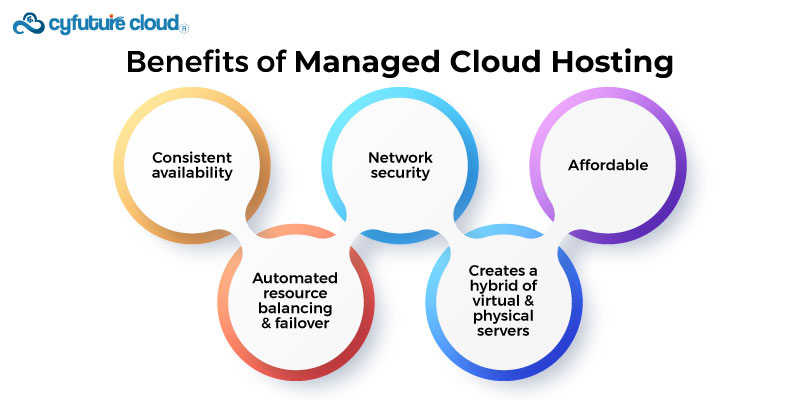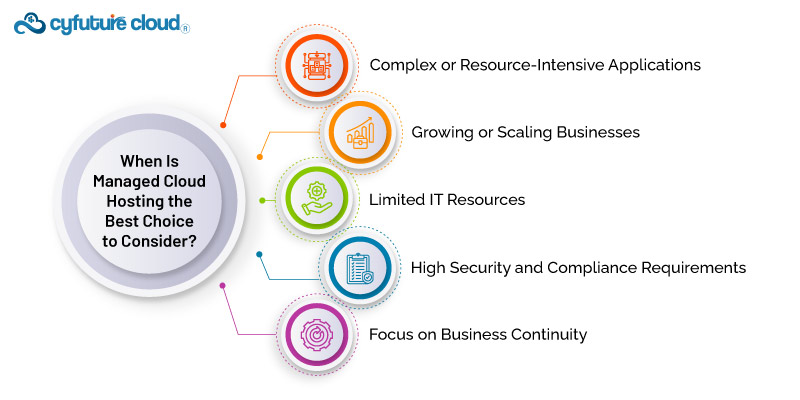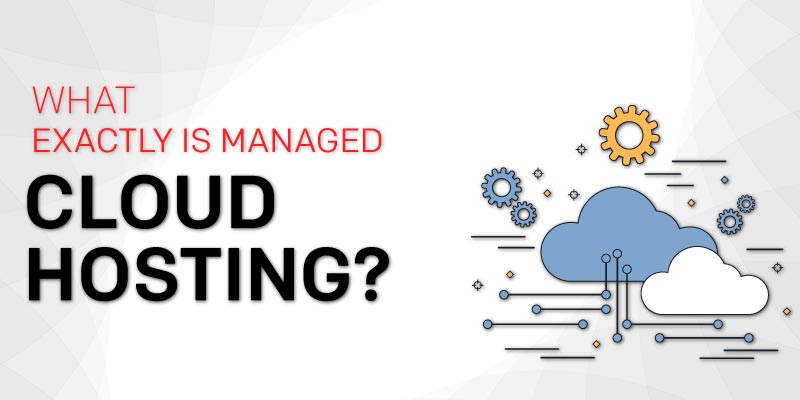 Server
Colocation
Server
Colocation
 CDN
Network
CDN
Network
 Linux Cloud
Hosting
Linux Cloud
Hosting
 VMware Public
Cloud
VMware Public
Cloud
 Multi-Cloud
Hosting
Multi-Cloud
Hosting
 Cloud
Server Hosting
Cloud
Server Hosting
 Kubernetes
Kubernetes
 API Gateway
API Gateway

In a simple way, managed cloud hosting is a comprehensive service in which a third-party provider oversees all aspects of your cloud infrastructure, from setup to maintenance.
Until recently, traditional server web hosting was the primary choice for hosting websites, despite its associated challenges. However, the emergence of cloud hosting has provided an alternative solution. Today, a growing number of individuals and businesses are opting for cloud hosting over traditional web hosting.
In our knowledge base, we provide information on cloud hosting, managed cloud hosting services, their benefits, and other related topics.
To learn about managed cloud hosting in detail, keep on reading.
1. What is Cloud Hosting?
Cloud hosting is a sort of hosting in which the data for the website is spread over numerous servers. This is a significant shift from traditional hosting, in which all website data is housed on a single server unit.
There are several types of traditional hosting methods where multiple websites are housed in a server, but in Cloud Hosting, the website data is housed in multiple cloud servers. This ensures a high level of data redundancy and data protection.
2. What is Managed Cloud Hosting?
Managed Cloud Hosting is basically a type of hosting plan that web hosting companies offer. Basically, this is a type of hosting service which is managed by a third-party provider that manages, administers, and oversees the infrastructure, security, and technical aspects of hosting your applications or websites on a cloud platform.
In essence, this implies that you simply select the package and operating system that you like and leave the rest to the web hosting business. To handle all other system administration and server upkeep demands, the web hosting firm employs skilled system administrators and online security specialists.
With managed cloud hosting, the provider takes care of the day-to-day management tasks, including hardware, network resources, software, storage, and other components of the cloud ecosystem. This enables you to concentrate on your primary company tasks.
Businesses may avoid the costs of building up and maintaining their IT infrastructure by choosing for managed cloud hosting, while also benefiting from enhanced accessibility, flexibility, and dependability.
3. Difference Between Cloud Hosting and Managed Cloud Hosting?
|
Aspect |
Cloud Hosting |
Managed Cloud Hosting |
|
Ownership and Control |
Self-managed by the user or organization. |
Managed by a service provider or hosting company. |
|
Server Management |
Users are responsible for configuration, maintenance, server setup, and security. |
Service provider takes care of configuration, server setup, security, and maintenance. |
|
Expertise Required |
Requires a high level of technical expertise to manage and maintain servers. |
Requires less technical expertise as the service provider handles most tasks. |
|
Scalability |
Scalable, but users need to manage the process. |
Scalable, and the provider assists in scaling. |
|
Customization |
Offers greater customization and flexibility. |
Limited customization options in some cases. |
|
Cost |
Generally more cost-effective but requires time and resources for management. |
Can be more expensive due to added management and support services. |
|
Security |
Users are responsible for putting security measures in place and keeping them up to date. |
Service providers often include security features and monitoring services. |
|
Performance Monitoring |
Users are responsible for monitoring server performance and addressing issues. |
Service providers often include performance monitoring and issue resolution. |
|
Backup and Recovery |
Users need to set up and manage backup and recovery solutions. |
Service providers typically offer automated backup and recovery options. |
|
Support |
Limited support, often through a ticketing system or community forums. |
Comprehensive support with 24/7 assistance for technical issues. |
|
Updates and Maintenance |
Users need to manage updates and patches. |
Service provider handles updates and maintenance tasks. |
|
Downtime |
Potential downtime during maintenance or server issues. |
Service providers aim for high uptime and often guarantee uptime. |
4. Advantages of Managed Cloud Hosting

Consistent availability: It is built on a high availability and private cloud hosting architecture and employs excellent redundancy through its different servers, storage area network (SAN), and storage protection for dependable failover protection.
Automated resource balancing and failover: If a host stops working, cloud servers are at an advantage due to their consistently available infrastructure. Failover and resource balancing across hardware hosts are managed automatically at the virtualization level, and it can maintain and upgrade software and hardware.
Network security: To deliver a highly protected environment Intrusion Detection System (IDS)/Intrusion Prevention System (IPS) may be used in cloud servers and Virtual local area networks (VLAN) is used to protect firewalls.
Creates a hybrid of virtual and physical servers: Because applications and database engines may share a dedicated server network with cloud servers, a hybrid of virtual and physical servers can be created on the same system.
Affordable: The prices of a managed cloud are comparable to those of most public clouds. The resources and services are both invoiced on a per-use basis.
5. How Does Managed Cloud Hosting Differ From Traditional Hosting?
|
Aspect |
Managed Cloud Hosting |
Traditional Hosting |
|
Server Infrastructure Ownership |
Managed by a service provider. |
User or organization-owned hardware or servers. |
|
Server Management |
Managed and maintained by the provider. |
Users are responsible for server management. |
|
Expertise Required |
Requires less technical expertise. |
Requires high technical expertise. |
|
Scalability |
Easily scalable with assistance from the provider. |
Scalability may require additional hardware purchases and manual setup. |
|
Customization |
Limited customization options in some cases. |
Greater customization and control over server configuration and software. |
|
Cost |
Generally more expensive due to added management and support services. |
Typically cost-effective but may require additional time and resources for management. |
|
Security |
Service providers often include security features and monitoring services. |
Security measures and configurations are the user's responsibility. |
|
Performance Monitoring |
Providers often include performance monitoring and issue resolution. |
Users need to monitor and address performance issues themselves. |
|
Backup and Recovery |
Service providers typically offer automated backup and recovery options. |
Users need to set up and manage backup and recovery solutions. |
|
Support |
Comprehensive support with 24/7 assistance for technical issues. |
Limited support, often through a ticketing system or community forums. |
|
Updates and Maintenance |
Service provider handles updates and maintenance tasks. |
Users need to manage updates and patches. |
|
Downtime |
Service providers aim for high uptime and often guarantee uptime. |
Potential downtime during maintenance or server issues. |
6. How Does Managed Cloud Hosting Compare to Other Hosting Options Available Today?
|
Aspect |
Managed Cloud Hosting |
Shared Hosting |
VPS Hosting |
Dedicated Hosting |
|
Server Infrastructure Ownership |
Managed by the provider. |
Shared with other users. |
User or organization-owned. |
User or organization-owned. |
|
Server Management |
Managed by the provider. |
Managed by the provider. |
Requires user management. |
Requires user management. |
|
Expertise Required |
Requires less expertise. |
Minimal technical skills. |
Moderate technical skills. |
High technical skills. |
|
Scalability |
Easily scalable. |
Limited scalability. |
Scalable to some extent. |
Scalable to some extent. |
|
Customization |
Limited customization. |
Limited customization. |
More customization. |
High level of customization. |
|
Cost |
Generally more expensive. |
Affordable for most. |
Affordable for most. |
Expensive. |
|
Security |
Includes security features. |
Limited security features. |
Basic security features. |
High level of security. |
|
Performance |
Excellent performance. |
Shared resources affect performance. |
Dedicated resources for better performance. |
Highest performance. |
|
Backup and Recovery |
Offers automated backup and recovery options. |
Limited or no backup options. |
May require setting up backup solutions. |
May require setting up backup solutions. |
|
Support |
Comprehensive support. |
Limited support. |
Varies by provider. |
Varies by provider. |
|
Updates and Maintenance |
Provider handles updates and maintenance tasks. |
Provider handles updates and maintenance tasks. |
User-managed updates and maintenance. |
User-managed updates and maintenance. |
|
Downtime |
Aims for high uptime. |
Susceptible to downtime due to shared resources. |
Less susceptible to downtime than shared. |
Minimal downtime. |
7. When Is Managed Cloud Hosting the Best Choice to Consider?

If you’re a web developer or website owner, you may have experienced the challenge of deciding which type of hosting to choose for your site or application.
This might be owing to the numerous web hosting services available on the internet. If you’re spoilt for choice, here are a few things when managed cloud hosting service is best to consider.
Complex or Resource-Intensive Applications
If you’re handling any complex web application or website that needs a lot of resources, then in such a situation managed hosting might be the best choice.
To ensure the smooth functioning of the website or your application it is the responsibility of the provider. Also, they can handle traffic spikes without any performance issues. Additionally, your provider will also offer support for any particular software you might require to run your application.
In addition, businesses that host complex or data-intensive applications such as e-commerce, CRMS, or CMS, therefore, need managed hosting.
Growing or Scaling Businesses
If you are involved in the fast-growing business, you might want to consider managed hosting. As your company expands, you'll want more resources, and your servers will need to scale.
To meet rising traffic and consumer demand, growing enterprises require additional resources. Managed hosting providers offer scalable hosting solutions that can expand to accommodate your business growth needs.
You can focus on expanding your business while knowing that your hosting provider can handle peak traffic volumes.
Limited IT Resources
If you have a small team and limited IT resources, you might want to consider managed hosting. Expert teams at managed hosting companies may handle backup and recovery, performance monitoring, server configuration, security, and patch management.
This allows your IT team to focus on more important activities, such as building new apps or upgrading current ones.
High Security and Compliance Requirements
When dealing with crucial data such as personal records, information related to finance, and critical information related to business, security and compliance are crucial.
Managed hosting providers can meet these requirements by providing advanced security features, including intrusion detection, firewalls, and prevention systems, and data encryption.
They may also guarantee that your servers conform with industry standards such as HIPAA, PCI DSS, and GDPR.
Focus on Business Continuity
If your company is substantially reliant on its website or apps, you might think about managed hosting. You can assure high availability and uptime for your apps by using managed hosting.
Managed hosting providers offer disaster recovery and business continuity services. In the case of a disaster, you can keep your business running with little downtime and data loss.
24/7 monitoring guarantees that any crisis is noticed and treated as soon as possible to ensure company continuity. Because your supplier handles data backup and disaster recovery, you can concentrate on keeping your business functioning.
8. Conclusion
Managed Cloud Hosting is an easy and reliable hosting service that gives your website great speed, flexibility, and security. It takes care of all the technical work for you, so you don’t have to worry about complicated setups and can focus on running your website smoothly.
With Managed Cloud Hosting, you can relax knowing your site will always be online, safe, and ready to support your business needs.
Just make sure to choose a trusted and professional hosting provider that matches your goals, offers flexible plans, clear pricing, and dependable customer support!

Let’s talk about the future, and make it happen!
By continuing to use and navigate this website, you are agreeing to the use of cookies.
Find out more




